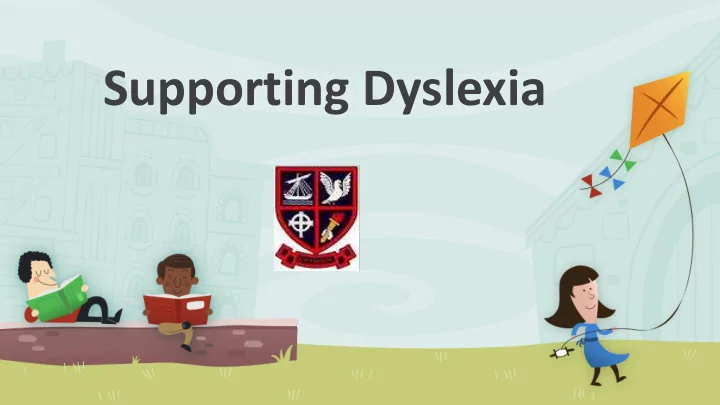

Supporting Dyslexia
Scottish Definition of Dyslexia Dyslexia can be described as a continuum of difficulties in learning to read, write and/or spell, which persist despite the provision of appropriate learning opportunities. These difficulties often do not reflect an individual's cognitive abilities and may not be typical of performance in other areas.
htt ttps:/ ://www.youtu tube.com/watch?v=zafiGBrFkRM
Possible indicators: early years • delayed speech/language development; difficulty sequencing speech and using language; mispronouncing multi-syllable words • difficulty with balance • poor coordination, clumsiness • difficulty following instructions • difficulties with memory • cannot hear rhymes in words or alliteration • confuses b/d , 2/5 • poor concentration span • family history of similar difficulties • low self-esteem
Possible indicators: middle years Difficulties with reading: • Difficulty learning the connection between sounds and letters • Difficulty separating words into sounds and blending • Difficulty decoding words • Misses sounds or words out • Reads slowly • Reading by memory • Word substitutions (e.g. horse for home) • Confusion of similar looking words and sounds (e.g. ‘off’ for ‘of’, d for b) • Transposals (e.g. tip for pit) • Poor directionality (e.g. difficulty moving from left to right, misses out lines )
Possible indicators: middle years Difficulties with writing: • Delay in learning to write • Poor spelling • Limited written output • Good content, poor presentation • Transposition of words and letters (e.g. tip for pit) • Reversals and inversions of letters (m for w, d for b) • Mixing upper and lower case letters • Badly or wrongly formed letters • Difficulty copying from the board • Disorganised sequencing in a story • Confusion over punctuation and grammar
Possible indicators: middle years Behaviour: • Under active behaviour- ”lazy” • Switched off behaviour- ”dreamy” • Difficulties with attention and concentration • Anxious • Lack of confidence • Challenging behaviour • Limited motivation • Negative attitude to school
Key strategies for supporting dyslexia • Reinforcement and overlearning • Multi-sensory structured phonics programme • Active learning • Extra time • Exam concessions • Use of ICT • Opportunity to use strengths, different modes of expression • Praise and recognition for effort as well as achievement • Ensuring that pupil challenged at the appropriate level • ‘Dyslexia friendly’ classroom
Key strategies for supporting dyslexia • Reinforcement and over learning • Multi-sensory structured phonics programme • Active learning • Use of ICT: Clicker 7, Ivona, CPen • Opportunity to use strengths, different modes of expression • Praise and recognition for effort as well as achievement • Ensuring that pupil challenged at the appropriate level • Programmes of work e.g. Nessy, Toe by Toe. • Universal Plan • Extra time • Exam concessions • ‘Dyslexia friendly’ classroom
Supporting dyslexia in school: dyslexia friendly classroom • Keep instructions short, simple and one at a time • Support instructions with visual cues/lists • Encourage the use of aids e.g. calculator, number line, multiplication grid • Reading aloud optional • Provide handouts to avoid copying from the board • Larger print , coloured overlays if visual stress present • Encourage a variety of forms of expression: personalisation and choice of response • Extra time for reading and writing tasks • Content not marked for spelling • Encourage the use of visual strategies (e.g. mind maps, highlighters) • Consideration to seating • Encourage peer support
Supporting dyslexia at home: how you can help Be understanding: • Remember that your child will be working harder than their classmates or siblings because of the processing difficulties associated with short term memory. This means that they may come home exhausted, frustrated and possibly angry with themselves and others. Your role is to provide as much praise as possible for what they have done well and help them stay organised.
Supporting dyslexia at home: how you can help Be encouraging: • You have a tremendous influence on your child’s attitude to learning. Remind them that everyone is good at something and even though they find some things difficult, they have other strengths. • Your child’s success will be greatly increased if they feel confident. If they feel confident then they will keep trying: Growth Mindset.
Supporting dyslexia at home: how you can help Be supportive and patient: • Liaise with the class teacher and Support for Pupils staff, particularly about homework. • Share your concerns with school and discuss ways to tackle problem areas together. • Try to avoid failure at home • Allow time to relax – your child will be tired after trying to keep up all day. • Give hints and reminders – being tired makes short term memory worse.
Supporting dyslexia at home: how you can help Be organised: • Establish a routine, with rest periods. You know your child and what suits best. • Create a clutter -free homework area at home to help with focus and concentration. Have everything to hand in the one place. • Plan for breaks during homework, breaking large tasks down to manageable tasks. • Make sure you are familiar with your child’s school timetable so you can help with daily organisation. • Keep a notice board with important information to hand.
Supporting dyslexia at home: how you can help Be positive: • Do not show your anxiety – be calm and encouraging. • Read longer texts aloud together and discuss how your child will tackle them. • Encourage your child to do things they enjoy/are good at. • Access as much information as you can about dyslexia and encourage your child to go online to: https://unwrapped.dyslexiascotland.org.uk/
Recommend
More recommend